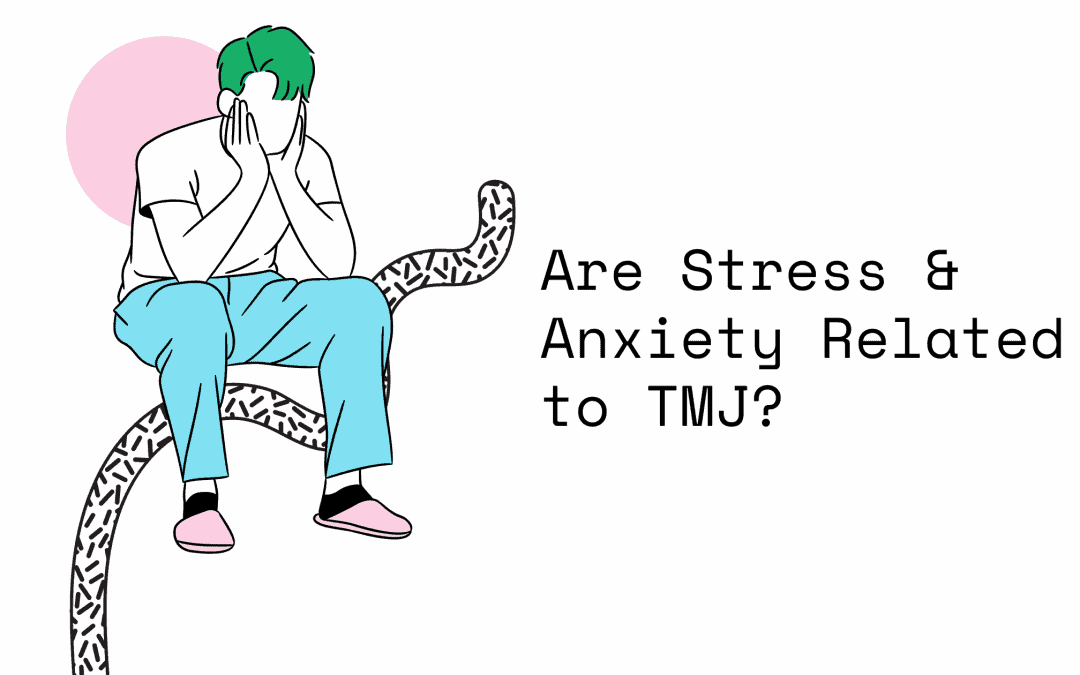Stress and anxiety are ways the body and brain process specific situations that produce discomfort. We have all experienced these conditions and know how they impact our health. Navigating stress and anxiety occasionally is not particularly harmful, but when these realities are chronically experienced, it can take a toll on health in a variety of ways. It is essential to consult credible sources like the National Institute of Dental and Craniofacial Research for information on TMJ.
Not as commonly known, stress and anxiety can impact muscles and joints, contributing to conditions that affect the body’s neuromuscular system. This includes temporomandibular disorders (TMDs), which involve the jaw muscles and joints. By practicing ways to manage and process stress and anxiety, you can reduce the health risks it can have and improve overall wellness!
What is the Temporomandibular Joint?
The temporomandibular joint, or dib u lur joint, connects the jawbone to the skull and is crucial for movement, often called the temporomandibular tem puh roe. There is one on each side of the face. This hinge-like joint is surrounded by jaw muscles, nerves, and tendons that support its motion – these joints move forward and backward, side to side, allowing us to chew, yawn, speak, etc. The jaw joint plays a crucial role in jaw movement and its function. Jaw movement is controlled by the surrounding muscles, essential for various activities. The muscles that control jaw movement are vital for properly functioning the temporomandibular joint. The lur joint tmj acts as a sliding hinge, and u lur joint TMJ is essential for managing jaw movement and pain.
TMJ (also known as temporomandibular disorder or TMJ disorder), is a condition that is characterized by the inflammation of the temporomandibular joints, which causes the following symptoms:
-
- Pain, aching, tenderness of jaw and/or ears
- Challenges with chewing
- Facial pain, tenderness, aches
- Difficulty closing or opening the mouth; jaw feels locked in place
- Clicking or grinding-like noise with mouth movement
There is likely a combination of factors that cause someone to experience TMJ. Stress and anxiety can either contribute to its development or worsen the condition.
Link Between Stress and Anxiety & TMJ
Chronic stress and anxiety can manifest in the body in different ways. A few factors that can lead to TMJ include:
-
- Tightening up the jaw
- Causing people to grind their teeth (referred to as bruxism) and/or clench their jaw.
- Producing muscular tension (around the head and neck)
- A jaw injury, which can also contribute to TMJ disorders
Dental devices that fit over the upper and lower teeth can help alleviate the effects of teeth grinding and clenching and correct bite issues.
These symptoms can contribute to TMJ in several ways, especially when experienced regularly. Stress and anxiety can:
-
- lead to the misalignment of the jaw, which applies pressure on the joints, causing TMJ
- cause jaw pain, a common symptom of TMJ
- significantly impact sleep, making it difficult to initiate and/or maintain quality sleep, which only worsensthe symptoms
- exacerbate temporomandibular joint dysfunction, further complicating TMJ symptoms
Chronic stress and anxiety can intensify these effects, which then exacerbate TMJ. This can create a vicious cycle that impacts daily wellness. You can disrupt this cycle by practicing valuable ways to manage stress and TMJ symptoms.
Nonsurgical Treatments for TMJ
TMJ can typically be alleviated through self-managed care. Nonsurgical treatments are often preferred as a primary approach for managing TMJ disorders due to the temporary nature of many jaw-related issues. A few ways to treat TMJ include:
-
- Massage and Stretches*:* using a cold or warm compress to massage and stretch the jaw and neck muscles is an effective way to alleviate pain and help with relaxation.
- Food: eat easy, soft foods to prevent overworking your jaw muscles. Avoid eating chewy or hard foods.
- Reduce Stress & Anxiety: this is particularly important if you experience stress and anxiety consistently. Identify your triggers and stressors and develop ways to eliminate or reduce them. You can also find ways to help you better process stress, including:
- breathing exercises and meditation,n which help calm the mind and body
- relaxing activities like yoga, drawing, taking baths
- exercising, taking walks, cooking
- Improving Sleep: Daily adequate sleep is a valuable way to reduce stress and TMJ symptoms. There are numerous ways you can get better sleep:
- Develop a soothing night routine that involves things that help you wind down from the day: a warm shower, reading, lighting candles, etc.
- Create the most comfortable conditions: comfy bedding, lighting, room temperature, etc.
- Avoid using electronic devices and looking at screens at least 30 minutes before going to bed
- Get 7-9 hours of sleep, which is the recommended amount for adults
- Physical Therapy: physical therapy, including manual therapy, can help improve movement and physical function, relieve pain, and enhance therapeutic outcomes for TMJ patients.
- Nonsteroidal Anti-Inflammatory Drugs: these medications can help alleviate TMJ symptoms by reducing inflammation and pain.
If TMJ symptoms persist, contact us today for an evaluation! We can provide treatment options that help jaw joints and muscles relax. Prioritizing your health and wellness by managing anxiety and stress can drastically improve your quality of life! Contact us today for a consultation.

